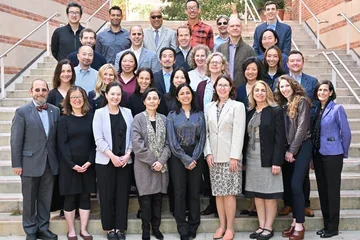Why Study Medicine Abroad?
UCLA Medical Students Gain New Perspectives

Study-Abroad Programs Can Help Build Stronger, More Culturally Sensitive Physicians
Having the chance to travel beyond the U.S. can shape students' perspectives and influence their career goals well into the future. Studying in another country during college, whether at the undergraduate or graduate level, is a great opportunity to experience these other cultures.
Students may be studying medicine abroad, taking business classes, or even fulfilling foreign-language requirements. No matter the focus, being able to explore internationally is crucial to making an informed choice about one's professional interests.
Going Overseas
Steffanie Becerra, a UCLA medical student, traveled to London, England, during her undergraduate training at the University of Southern California. She said it was difficult to find the time as a premed student, but she's so glad she did — it was "amazing."
"The experience opened my eyes to opportunities that exist for driven, committed individuals around the globe," she says.
After receiving her bachelor's degree, Becerra came to the David Geffen School of Medicine at UCLA where she is currently working toward her medical degree. She's also pursuing a Master in Public Health in Global Health Systems and Administration from Tulane, with plans to ultimately specialize in Family Medicine.
The opportunity to travel overseas helped cement her global view and commitment toward medicine for underserved populations.
"The study-abroad experience gave me the awareness that if I worked hard, combined with my passion for serving the underserved, I could make a positive impact on the health of communities domestically and abroad," she explains.
Influencing Medical Education
Fueling her passion for global health, Becerra has continued traveling beyond the undergraduate level. She also gained hands-on experience studying medicine abroad through an internship with the United States Agency for International Development (USAID). Here, she worked on international pediatric HIV programming and traveled to both Zambia and South Africa.
Having attended an Accelerating Children on HIV Treatment meeting as well, Becerra feels these amazing experiences combined with her education will make her a "better, more culturally responsive clinician in the future."
"Disease respects no boundaries or borders," she says. "It's important for all of us to work on improving the health of our communities because it affects each and every one of us."
Studying in another country is an excellent opportunity for anyone considering medical school. With constantly changing health delivery systems, having the chance to view other ways of providing for various healthcare needs around the globe only makes for stronger clinicians.
Many universities, including UCLA, have a range of opportunities to study abroad. Whether students want to improve business skills for a future role as an administrator or study global health to become an active, vocal physician, the options are vast.
(Related Article: The Benefits of Bilingual Physicians)



